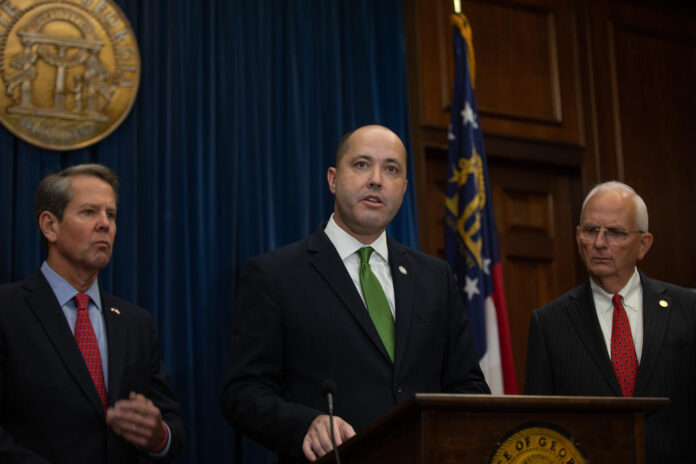
(Georgia Recorder) — Attorney General and announced gubernatorial candidate Chris Carr is hoping a new administration in Washington will mean relief for Georgia farmers who are set to pay more to migrant agricultural workers, but advocates say the laborers often don’t receive what they are owed despite working in difficult and unsafe conditions.
“Our office’s request is to work with you and the Trump Administration to address the rising (wage rate) before Georgia farming simply becomes unaffordable,” Carr wrote in a letter to President-elect Donald Trump’s nominees to lead the U.S. departments of agriculture and labor for his second term, Brooke Rollins and Lori Chavez-DeRemer. “We believe the health of our farms is directly tied to the food security, national security, and economic security interests of the United States.”
The federal H-2A program offers temporary work to people from foreign countries when there are not enough U.S. workers available for the job. The federal government sets their pay rate by region, and the rate is typically higher than the going rate for U.S. workers. That’s in part to prevent farmers from importing cheap foreign laborers and leaving American farmhands jobless.
On average, the rate for H-2A workers is set to rise 4.5%, according to the U.S. Farm Bureau, but the actual changes will vary by region. In Georgia, the rate is set to rise from $14.68 to $16.08, or 9.5%. Nationwide, wages for civilian workers increased 3.9% between September 2023 and 2024, according to the Bureau for Labor Statistics.
Overall, the lowest rate for H-2A workers is set to be $14.83 in Mississippi, Louisiana and Arkansas and the highest is $20.08 in Hawaii.
Last December, Carr’s office reached out to Biden administration officials Julie Su, the acting labor secretary, and agriculture secretary Tom Vilsack to express concern about the effect rising wages could have on Georgia farmers.
Carr’s office says farmers are actually paying more because of visa fees and travel and lodging expenses and they argue that the government is not transparent in the methods it uses to calculate rates.
Agriculture and related industries contributed $83.6 billion and 323,000 jobs to Georgia’s economy in 2022, according to the University of Georgia’s Center for Agribusiness and Economic Development. Carr argues that raising costs for farmers could put that industry at risk.
But H-2A workers are already at risk from bad working conditions and often do not even see the money they are owed, said Solimar Mercado-Spencer, director of the Farmworker Rights Division at Georgia Legal Services, a nonprofit law firm.
In a 2021 sting known as Operation Blooming Onion, law enforcement officers charged two dozen people with fraudulently using the H-2A program to traffic workers into south Georgia to work under conditions prosecutors called modern-day slavery.
Three years later, H-2A workers are dealing with exploitation and dangerous conditions.
Georgia currently hosts more H-2A workers than any state except Florida. Most of the workers are men and about 90% of them come from Mexico, Mercado-Spencer said. They rarely speak any English and are usually unfamiliar with the U.S. and its legal system.
Many use the money to support not only their wives and children, but also extended family, so they’re typically eager to work, but sometimes they are taken advantage of by recruiters who charge them illegal junk fees to come work in addition to bona fide fees and expenses.
“Since they pay all these expenses up front, they took a loan back in their country to afford that,” Mercado-Spencer said. “So since they started their work, they already have this debt that they have to pay, they’re thinking about that, and then they come here with overcrowded housing in really bad shape, extreme temperatures, no AC, or heating when it’s cold, you see workers sleeping on mattresses on the floor, in living rooms, because they put so many workers in one spot.”
Most of the workers in Georgia work in the southern part of the state and often work harvesting labor-intensive crops like onions, blueberries and green peppers, Mercado-Spencer said.
“They can work long hours, there’s no right to breaks, they don’t have to provide breaks, it’s very hard work, and then sometimes they get shorted on their hours, so they’re not getting paid all their hours, or there’s amounts deducted from their paychecks that sometimes are bogus, not legitimate deductions, so they’re not getting paid what they’re supposed to get paid,” Mercado-Spencer said.
“Then since they have this debt and they’re only authorized to work for the employer that hired them with this visa, they have no choice really but to stay and just withstand those conditions, so they can at least make some money and try to pay that loan back,” she added.
Mercado-Spencer said a wage increase would make law-abiding farmers pay more or improve conditions to attract American farm laborers, but without enforcement, she’s skeptical the workers that complain to her would benefit from a raise at all.
“All of us, including farmers, including consumers, we all are benefiting from this labor, from these farm workers,” she said. “So we should be treating them fairly. It shouldn’t be all about benefiting farmers and consumers. We’ve got to think about the workers too when we are looking at these issues and be respectful and grateful for their service.”






